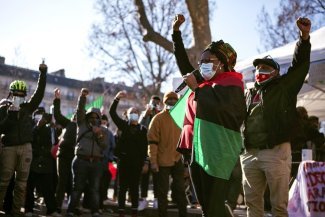Surprise. Tuesday 1 September, at 1 pm, 45 “You Stink” activists infiltrate the Environment Ministry to press Mohammed Machnouk to resign. Taken by surprise, the Environment Minister holed himself up in his office then called the anti-riot police to evacuate the protesters by force.
Surprise. This was term used by “You Stink” members three days earlier, in front of tens of thousands of protesters who had responded to their call to join them on Martyrs Square in Beirut.
Bolstered by popular support without precedent in the national history of a nonpartisan social movement, they promised a surprise for the provisional government headed by Prime Minister Tammam Salam if it refused to respond to at least one of their grievances.
Their demands include the calling of legislative elections, to renew a parliament composed of members that have extended their term in office on two occasions without going to the polls.
Another relates to the prosecution of the police officers responsible for violence during demonstrations at which several protestors were attacked with rubber bullets, tear gas and truncheons, resulting in one demonstrator losing an eye.
The protestors are also demanding the opening of an inquiry into corruption plaguing the management of solid waste in Lebanon and the transfer of waste management to municipal authorities.
What came as no surprise is that the government has done little or nothing over the last three days.
#YouStink
Since the landfill receiving waste from Beirut and Mount Lebanon was closed on 17 July, plunging the country into a waste crisis that has gradually turned into a crisis of governance, the political class has chosen words over action.
The Environment Ministry’s call for public bids for waste management, aimed at resolving the sanitary emergency borne out of this crisis, was also supposed to put an end to the monopoly held by Averda, the company that had controlled the capital’s waste market for 17 years without ever having to bid for a contract.
Yet, as soon as the results were announced, they were rejected by the Council of Ministers, which deemed the prices of the companies selected to be too high. With the crisis left unresolved, after a month and a half, the 3000 tons of daily waste produced in the capital continue to pile up in the port, where workers have taken strike action, as well as in the city’s river and authorised dumps across the country.
It comes as no surprise either for “You Stink” activists to see political leaders, against whom Lebanese citizens have been protesting for a month, trying to discredit or hijack their movement.
First came the personal attacks. One of the “You Stink” leaders was accused of making remarks considered to be anti-Christian by members of the Free Patriotic Movement (FPM), the Christian party led by Michel Aoun, with ties to Hezbollah.
The pretext was a message that had been published on Facebook two years earlier, taken out of context to damage the image of a movement intent on being above the sectarian and party political divisions crippling Lebanon.
But above all, the more the numbers joining the protests swelled during the month of August, the more the political parties claimed to be close to their cause. Without, however, supporting their objectives.
The head of the FPM thus stated: “We are with those demonstrating, but there is a question mark: who is manipulating this movement?” He then went on to invite them to take part in the demonstration being held by his own party this Friday.
“The reactions from politicians from all sides only serve to remind us what kind of system we’re living in: the Interior Minister is capable of saluting our movement after having supressed it with force the day before,” points out Joey Ayoub, a member of the “You Stink” movement.
It is 6 pm on Tuesday and the young activist is busy feeding information across his social networks. “The police are on their way up to dislodge the protestors occupying the Environment Ministry,” he says, sitting on the edge of a pavement.
Around him, in front of each of the six entrances to the ministry, hundreds of people are taking part in a festive sit-in, after having found out the nature of the surprise through social networks or the television.
From the moment the activists entered the building, time has been marked by the shrill sound of the Red Cross siren piercing the chants calling for the resignation of Lebanon’s Environment Minister Mohammad Machnouk and the fall of the government.
It comes and goes on several occasions, carrying away the injured bodies of activists beaten with truncheons to force them out of the ministry. Photos later show activist Lucien Bourjeily on a hospital bed, his skin covered in bruises and his shoulder fractured.
Outside, the police charges at the crowd of demonstrators.
To prevent any violence, young men and women hold hands and form a human barrier between the security forces and angry protestors.
The strategy adopted by the activists has not convinced all their supporters. “They had the support of thousands of people and, instead of taking advantage of that to create a real political force, they wanted to get ahead of themselves,” regret Talal and Wassim, two volunteers from the “You Stink” committee, who travelled to the scene from the Bekaa Valley.
After nine hours of occupation, the Environment Minister had not resigned.
The FPM’s opposition, the Sunni-led Future Movement, also condemned the “invasion” of the ministry.
By way of a response to the street protests, the president of the National Assembly, Nabih Berri, called for talks between the various political leaders on 9 September.
In one of his latest nocturnal tweets, Joey Ayoub gibes: “At least we have managed to unite the sectarian parties of Lebanon in the condemnation of #You Stink. You see? Miracles can happen.”









